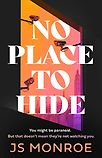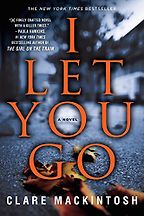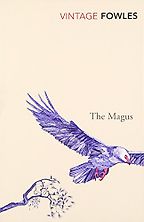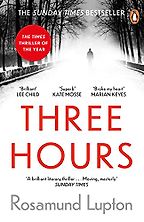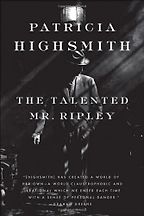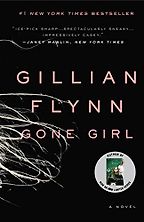Before we get to the specific psychological thrillers you’re recommending, can you give us a bit of an overview of the genre? What’s it about, why do you write in it?
I started writing spy thrillers under my own name, Jon Stock. Then, in 2017, I switched to writing psychological thrillers. I felt I’d explored everything I could explore for the time being in the espionage genre. Psychological thrillers have a lot in common with spy thrillers. Over the last 10 to 15 years—from Gone Girl onwards—they have relied heavily on the unreliable narrator. That’s something that really, really attracted me to the genre. I’m fascinated by characters who pretend to be something they’re not and I guess a logical extension of that is a narrator who is pretending to be something that they’re not. So the way you tell the story becomes as much part of the story as the characters themselves. You’re playing with a reader’s trust, which you have to be very, very careful about.
There’s also a requirement of the genre to do a lot of twists. That’s one of the hardest things about writing psychological thrillers: there is an appetite or an expectation for twists. I like doing twists, so that attracted me as well.
The other thing I would say is that the genre is shifting all the time. When I first started writing psychological thrillers, an element of police procedural was creeping in. You get a hybrid: from pure psychological thrillers you get a police element. Now it’s moving more and more into other territories. We had domestic noir—the couple upstairs or the second wife—those sorts of stories have come in as well.
Now—maybe as a result of lockdown—we are seeing more emphasis on slightly comforting, cozy crime. We’ve got a bit fed up with being shocked and tortured and horrified by awful narratives. So we’re seeing The Thursday Murder Club-type books coming in which are more on the crime end of the spectrum, but in some sense it’s all related.
Thinking about the psychological thriller genre, one thing that strikes me is that it’s about ordinary people in everyday situations. It could well be that I’d got very drunk at a party as a student and can’t quite remember what I did, or acted in a play at university and met all sorts of people I was in awe of—as happens in your book, No Place to Hide. It’s not about baddies threatening to blow up the world with a nuclear bomb. What’s attractive is that we could imagine it happening to ourselves. Would you say that’s part of it?
Absolutely. That’s perhaps one of the reasons why I moved on from spy thrillers. There’s that great divide in spy fiction between your Len Deighton everyman person, who you can relate to, and the Jason Bourne, superhero-type spy. I had a series with Daniel Marchant as my main character, who was working for intelligence services and wasn’t an everyman person.
When you’re writing psychological thrillers, you’re trying to put ordinary people into heightened situations. You’re trying to crank it up so the reader thinks, ‘This could happen to me! I can relate to this person who has suddenly found themselves in a situation which none of us hoped we would find ourselves in. It could happen.’ So yes, it is an important part of the genre that the main characters are ‘ordinary.’
Let’s go through the books, the psychological thrillers you’ve picked out for us. First on your list is I Let You Go by Clare Mackintosh, which starts with something very relatable as a mom: you let go of your child’s hand for a second and something terrible happens. Tell me about this book and why you like it.
What I love about I Let You Go is the twist. The book came out in 2015 and it was just such an impressive debut for Clare Mackintosh. There’s the difference between part one and part two and it all hangs on this twist. It’s one of those moments where I just sat up. It was like a gut punch. As a writer, I actually stopped reading the book, and went back and reread the first half. From a technical point of view, I wanted to check the wiring and the plumbing of the book to see whether it all hung together because what she was doing was so brave. Did it all work out? As a reader, do you feel cheated? Or do you feel ‘Wow!’ and have your breath taken away? I was completely misled. The misdirection was so convincing. The twist checked out perfectly from a technical point of view. It was really bold and it worked really well.
As you say, Jenna, the mother and the main character, was very relatable and it’s every parent’s worst nightmare. The book also saw the beginning of the hybrid psychological thriller/police procedural. There was a detective element to it as well.
I should say that Clare Mackintosh was very kind and gave me a nice plug for Find Me, my first psychological thriller. Her comments, and her quote, helped me enormously. I Let You Go was her debut and I think it’s probably still her best book.
Has she written quite a few since?
Yes. I haven’t read them all, but I’ve read quite a few. They’re good, but she just set such a high standard with this one.
Do you read a lot of thrillers yourself?
I do at certain times. When I’m writing a thriller, I tend to switch off and read other genres. I try and write books which are slightly different, and I feel that if I read too many in the genre, my books are in danger of becoming like everyone else’s. So I try not to get too embedded. I try and keep my eye on the best, on the books that are breaking new ground and who’s doing really well. I’m a big fan of JP Delaney who I think is very interesting as a writer.
“When you’re in this game, you live or die by a book’s readability”
So I wouldn’t say I read thrillers psychological thrillers all the time. That’s also, partly, because I’m terrified of accidentally plagiarizing or copying something. I try and keep my powder dry.
Let’s go on to your next recommendation, The Magus by John Fowles. This was first published in 1965. Tell me more.
Yes, and he revised it in 1977. This is a classic from my year off between school and university. I went interrailing and ended up on a Greek island with a battered copy of The Magus in my backpack—which I think everyone of a certain age should probably do—and I read it there. It’s the story of Nicholas Urfe, who’s a university graduate from Oxford and gets a job teaching English on a Greek island.
There are problems with the first part of the book. I’m not sure revisions are a good idea, but he could have addressed the misogyny at the beginning when Nicholas is still in the UK and he’s at parties with his Australian girlfriend. That made me a bit uncomfortable. But once you get onto the island, and he starts playing these mind games with Conchis—who is this mysterious, wealthy recluse living on the far side of the island—I just loved it.
In terms of storytelling, it has a sort of Tales of 1001 Nights/Scheherazade quality about it, tales within tales. The layers are peeled back: every time you think you’ve understood what’s going on, another layer of falsehood is peeled back to reveal that what you thought was a truth is anything but.
SPOILER ALERT
It’s been branded a ‘psychosexual’ thriller. There is that element with this beautiful woman who he falls in love with. Then she has a twin. And then you realize they’re actors. Then you meet them and they’re not actors. Conchis calls it the ‘godgame’ that he’s playing, and it is in danger of being a bit pretentious, certainly toward the end. But I just loved it. I reread it again a couple of years ago, back on holiday in Greece, this time with the family in tow, and felt it withstood a second reading.
I guess that principally it’s the mind games—the godgame—that I love. The Magus has also been described as a Jungian psychological thriller—and it does play with the unconscious and the conscious. But you can get out of it what you want. There are loads of metaphors in it and allusions to Greek mythology. You can let those wash over you if you like, or you can embrace them all. But the basic tenet is of a young person going to have this dream job teaching English at a school and then getting drawn into this weird, weird game which you just don’t know where it’s going. I love that.
I wanted to choose books that shaped and influenced me as a writer and that was one. Aged 18 or 19, that was the book that sowed the first seeds in my mind. I read it and thought, ‘One day I’d love to try and do something like that—play with the reader and have that layered approach, like an onion, where you keep peeling and peeling.’ In a sense, John Fowles is as much The Magus, the magician, as Conchis is. When you read this book, you do feel you’re in the presence of an illusionist.
Let’s move on to Three Hours by Rosamund Lupton, which is about gunmen entering a school.
Yes. It’s quite unusual for her. Her books defy easy categorization. They don’t fall easily into particular genres. Three Hours is set in a private school in the depths of Somerset. In terms of storytelling, the ticking clock is a great trope, this sense of three hours or 180 minutes. It’s played out in real time, which is a great feat of writing. If you really cracked on and read it, at pace, you could probably read it in three hours. So she’s using the well-known device of a time limit—in this case, a bomb that’s going to go off creates enormous tension—but she does something very clever with it.
Again, it’s multiple stories, which appeals to me. We have the stories of lots of different students within the school, as well as the head teacher, who is very badly injured right at the beginning. One group is in the middle of a Macbeth rehearsal when they get the alert, and the school is locked down. They don’t know where the gunmen are, and where the bomb might be. They’ve barricaded themselves in, and the drama teacher tries to keep people going, rehearsing Macbeth. There are some subtle allusions between the story of Macbeth and what’s playing out in the school. It might sound heavy-handed, but it’s not.
It’s also very contemporary. One really powerful storyline is about a 16-year-old refugee from Syria called Rafi. He hears this small explosion in the wood, recognises the sound of a bomb, and he’s the one who informs the head. Rafi is inside the school and his younger brother Basi, who’s very, very fragile, is somewhere out in the grounds. It has this extraordinary effect—it makes me feel slightly tingly just talking about it now—that love of a brother for his younger sibling. When refugees arrive in this country from Syria, it must feel like a real disconnect. And yet here was this person suddenly in a war situation with this ticking bomb in the ground of the school. The story of Rafi is just very, very believable.
The head teacher, Matthew, is also extraordinary. At one point, as they try and keep each other going, he says, “In the end it is all about love, it is all that matters.” It sounds like a Love Actually-type movie, but it isn’t. It’s done without any sentimentality, it’s just a stark statement of the facts. Ultimately in that situation, you’re just looking after each other.
Three Hours is very exciting as well. It’s really, really tense. It’s a fabulous book. It’s certainly one of my favorite books of recent years.
Given it’s a thriller, is one of the measurements of whether it’s a good book that you can’t put it down? That you feel compelled to read it in one sitting?
It is. When you’re in this game, you live or die by a book’s readability. When I’m writing a book, I have in mind a reader at two o’clock in the morning who’s just finished a chapter, and thinks, ‘Just one more!’ I’m shameless, I’m afraid. I make sure that the end of each chapter has something in there to make them want to read on, a driver of some sort to make them turn the page and see what happens next.
It’s quite fun. I spend maybe a year writing a book, and then someone will come up to me and say, ‘I read your book in an afternoon!’ Part of me thinks, ‘God! Do you know how long it took me to write the damn thing?’ And one part of me is thinking, ‘That’s fantastic, I couldn’t ask for more.’ It is just one of those things, that you spend all that time doing something and then it’s read that quickly.
I remember when Ian McEwan wrote Sweet Tooth, I was a journalist and I interviewed him about the paperback. Sweet Tooth was his stab at a spy thriller, and it has a lot of unreliability in it. It’s a really good book. But I remember him saying that he was slightly worried people weren’t going to be savoring the nuances of every sentence he wrote. I said, ‘Yes, you are going to be having people speed reading your prose.’ I think he found that difficult because he takes so much care over how he crafts sentences. The idea that someone might just be flicking through the pages, not really observing how he balanced two clauses in a sentence and included internal rhymes…I had to say to him, ‘You’re probably going to have to let that go, because people are going to be reading this for the story.’
So readability is a big thing, but I think actually the next book on my list, The Talented Mr Ripley, I did savor more. I wouldn’t say I ripped through it in the way I did with Three Hours. With Three Hours, I actually read it twice. I was going to interview Rosamund Lupton at the Marlborough Literary Festival, so I read it again and felt it was even better the second time round. But with The Talented Mr Ripley, I enjoyed the language and the craft more. It’s a brilliant book. I didn’t read it just for its sheer flicking the pages, adrenaline rush of a helter-skelter ride.
For those who don’t already know it, The Talented Mr Ripley is by the American writer Patricia Highsmith and was published in 1955. It’s the oldest psychological thriller on your list, but when I last read it, it didn’t feel dated.
It’s described as the godfather of the modern psychological thriller. Everyone who writes psychological thrillers must acknowledge Patricia Highsmith at some point. She gave the genre legitimacy in that she was quite a highbrow writer writing popular fiction, so we all quote this book and mention it, hoping some of it rubs off on our own books.
What appealed to me most about this book is that Tom Ripley is the ultimate sociopath, and yet we’re rooting for him. In my first book, back in 1997, I had an antihero, an anarchist called Dutchie, who had lost his girlfriend in an IRA bomb. It was very difficult to do as a first book, but I was trying to get people to root for him: not necessarily like him but be on his side. It was a challenge.
With Tom Ripley, he’s very charming, but we know what he’s doing is not right. He has to go and find Dickie Greenleaf and convince him to come back to America. He’s on a mission from Dickie’s dad, Herbert. The other big takeaway I had from this book—and I still feel like I haven’t done this yet, but I want to—is that I love books where someone impersonates someone else. I just love the idea of someone taking on someone else’s identity. Identity, I should say, is a crucial part of the psychological thriller, and certainly the psychological thrillers I write. Identity is a big part of memory, and what makes someone who they are and how you would impersonate them.
The Talented Mr Ripley is also interesting because it doesn’t have a happy ending, really. You feel Highsmith has endorsed this sociopath, doing this bad thing, impersonating someone else and taking on their life but there isn’t that classic happy ending. It’s a reminder that her moral compass is still intact. You’ve been on a bit of a journey, you are siding with the bad boy. It’s an interesting play on the morality, which is a really big issue in my books, if I may very briefly mention No Place to Hide.
Yes! I stayed up late into the night reading No Place to Hide. I started in the afternoon and finished it at about 3 am.
That’s very kind though, again, mixed feelings: do you know how long it took me to write it?! In it, the issues of good and evil are much more overt. It’s a very loose retelling of Christopher Marlowe’s play, Dr. Faustus. Marlowe’s play is brutal, Faustus is dragged kicking and screaming down to hell, there is no redemption. There is no forgiveness, he just messes up big time. There are two versions of the play and in one of them he appeals slightly more for forgiveness. The answer is, ‘Absolutely not, you made a deal, signed it in blood with the devil, the 24 years are up, you’re out of here’. I toyed with that. If No Place to Hide is a loose retelling of Faustus should my main character suffer the same brutal fate?
Which side I fell on that in the end was perhaps more a reflection of the fact that, ultimately, I like books in which, in a slightly corny way, good ultimately prevails. Because if you do enter this dark world of psychological thrillers—and my books are quite dark—you take readers with you. It was particularly the case with Find Me, which was probably my darkest book, my first JS Monroe. Somehow, at the end, you do have to come up for air so you’re not drowning. You don’t have to have a saccharine-sweet, happy ending, but there’s got to be a sense of hope. I would just feel too uncomfortable taking people to a dark place and just saying, ‘That’s it, I’m going to leave you here.’
No Place to Hide is a lot about surveillance. That’s quite a rich seam for psychological thrillers right now, isn’t it?
It is. I’ve done it twice now in the five books I’ve written. The Other You had quite a lot about facial recognition and facial recognition software. In the UK, we are one of the most surveilled societies in the world. There are action groups, people who monitor how much things are being recorded, but when there’s an awful news story, we’re all waiting for the CCTV footage. We think, ‘They won’t have been able to do that without being caught somewhere on CCTV. There’ll be a traffic camera somewhere. There’ll be a security camera on the front of an office, there’ll be dashcam footage, there’ll be something.’ When that comes out, we don’t all say, ‘That’s outrageous. I didn’t realize that we were being filmed!’ We go, ‘Thank goodness that they’ll catch the bad person.’ So we have this ambivalent attitude to surveillance culture in the UK. We are very watched. But I don’t hear people jumping up and down in their millions saying, ‘Turn off all the cameras!’ It makes us feel safer. It’s a weird dichotomy.
I find the mobile phone particularly intriguing. We do carry around these things which have the capacity to listen in on our daily lives. There’s just been the news that TikTok is not going to be allowed on government-issued mobile phones because they’re convinced the Chinese are listening in through it.
Yes, at home we don’t have Amazon Echo because my husband doesn’t want anyone listening to us.
You can do a test. If the microphone on your computer or your phone hasn’t been disabled, you can say, ‘I like red dog biscuits.’ And you will see adverts coming up for red dog biscuits. The algorithms are kicking in and you’ll get Google ads tailored to what you’ve been saying. Turn off the microphones is all you have to do. It is quite easy to disable everything. My kids are all in their 20s now, but they always have a plaster across the camera on their laptops because you never know what software you might accidentally have downloaded. If you want to go on FaceTime to talk to someone, peel the thing off, talk, and then put it back on again.
Have you read a good nonfiction book about surveillance for people who are worried about it?
Hannah Fry wrote a very good book called Hello World which I read when it came out in 2018. It had some good stuff in it, particularly about facial recognition which I was particularly interested in at the time. The automatic number plate recognition stuff is also interesting. Do you ever watch a program on TV called Hunted? People try and escape and they use the network of cameras across the country to work out where they are. When you go to the ATM, you’re being filmed. On our roads we have an extraordinary network: you see the signs saying ‘ANPR in action in this area.’ It’s everywhere.
Okay, we’d better get to your last psychological thriller. This is Gone Girl, a page-turner by Gillian Flynn. Tell me why you like this one.
The two big ones of the last 15 years are Gone Girl and The Girl on the Train. Gone Girl came out first and it influenced a whole generation of writers in the UK. What particularly appealed to me is what we talked about earlier.
SPOILER ALERT
It’s one of the best examples of bold writing with two unreliable narrators. That’s really good. You’ve got the split point of view, and you’ve got two time zones. Nick and Amy are married, and the first half is written as her diary from previously. Nick is in present time and he’s trying to work out where his wife has gone. The diary entries are sufficiently disturbing to make us think that he’s disposed of Amy, and that’s how the police begin to think.
This has influenced so many of my books. I often do multiple points of view, sometimes two, sometimes three. In No Place to Hide, I’ve done a first-person diary, and a third person in the past. In my first book, Find Me I also had a diary which turned out to be unreliable. What’s interesting about Gone Girl is that everything is unreliable. I really like that.
The other thing I liked in Gone Girl was the authenticity of Nick’s male voice. I thought that was particularly well done. I thought Nick was incredibly convincing as a character. It gave me the confidence to not worry about writing male or female characters because you’re dealing with people, ultimately. There’s no reason why a man can’t write in a female character and vice versa, but it is potentially going to get more contentious as an issue, whose stories we’re allowed to tell.
I felt it started brilliantly but got a little bit less convincing as it went on. Towards the end, I was getting a bit like, ‘What’s going on here?’
Yes, I know what you mean. Still, the overall feeling I had when I finished the book outweighed any misgivings. Endings are hard. The other thing that stands out for me in Gone Girl is the writing. It is a thriller and you’ll probably pass it on to someone, but she’s a good writer. The style, her use of words is really smart. It’s a cut above.
I read it at a time when I was devouring all these books before I started writing psychological thrillers. I was looking at all the best ones. In The Girl on the Train, you have three points of view, you’re moving the camera around. That’s something which I’ve always done. No Place to Hide is the first one I’ve done with just one point of view, although it’s past and present. Usually, I have three characters telling the story. I’ve moved away from police procedure as well. No Place to Hide is just a standalone, psychological thriller without any police in it at all. There is no washed-up, drunken and divorced detective.
You’re right about endings being hard. I remember when I was about 21, I stayed up all night reading The Firm by John Grisham. It has this brilliant set-up, it was really engrossing. Then, towards the end, I thought, ‘Oh well. Fine, but not as great as the beginning.’
I often get accused of rushing endings, so now I pace myself. I allow myself enough time. I start the ending earlier so I’ve got enough energy to write it properly and can give it a big bang. Have you been to the Minack theatre in Cornwall?
No, but I want to after reading No Place to Hide!
It’s a really, really dramatic cliff-front theater. It’s quite extraordinary. I thought, if I can’t end a book there, with a literal cliffhanger…
Five Books aims to keep its book recommendations and interviews up to date. If you are the interviewee and would like to update your choice of books (or even just what you say about them) please email us at [email protected]
Five Books interviews are expensive to produce. If you've enjoyed this interview, please support us by donating a small amount.

